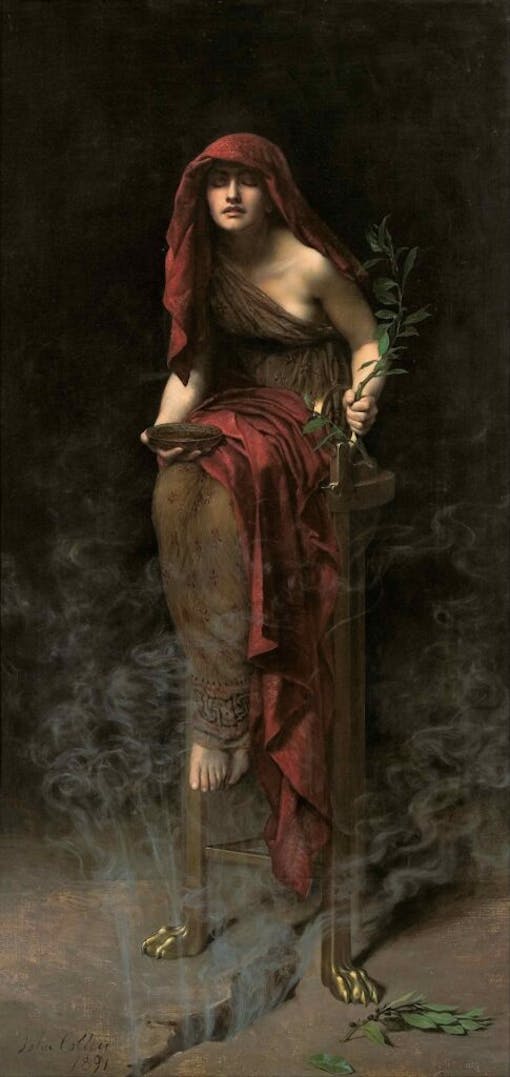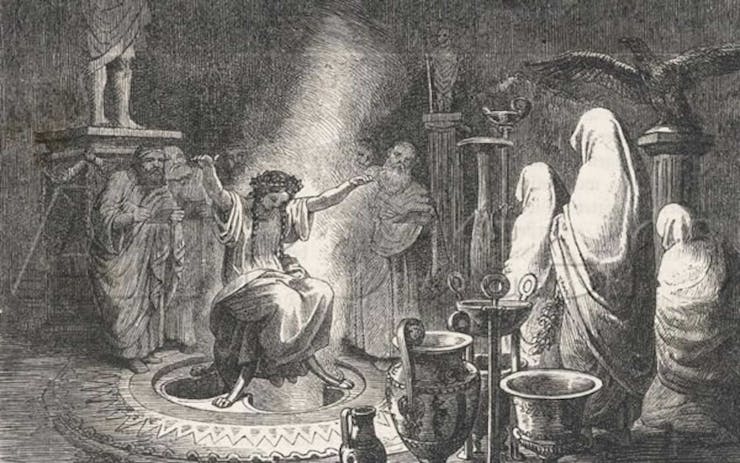There was a time when those who could tap into otherworldly energies were precious to rulers and royalty, and village peasants equally prized a local seer to resolve their everyday matters. Mystics throughout the ages have been any gender, but typically men took up organized religion while women were pushed to religion’s outer fringe: the occult.
Rightly or wrongly, today’s fortune tellers, clairvoyants, and psychics are the heirs of a long female-led tradition. And, for many women of history at least, this tradition used the mind-bending powers of cannabis to access the supernatural.
Here are just a few women of renown who got high and channeled the divine.
The Oracle of Delphi: 700BCE (or earlier) to 300CE

23602133)
Called the Pythia for her ability to commune with the Greek god Apollo—known as the “python slayer”—the position of oracle at the famous temple of Delphi was filled by a succession of priestesses who each channeled the voice of Apollo.
Once the most important prophetic position in ancient Greece, the Pythia is said to have warned Oedipus of his tragic fate—that he’ll kill his father and marry his mother.
When preparing to give oracular statements, ancient historians describe the Pythia as chewing bay leaves, inhaling smoke from a variety of plants, and sitting over a chasm in a rock to draw in its vapors.
She would then deliver cryptic prophesies in a trance-like state, which attending priests committed to paper for the awaiting seeker.
Some scholars suggest the bay leaves contained opium and datura, while others say the sweet-smelling burning plants were cannabis, barley, and laurel. Archaeologists think the chasm in the rock exposed the Pythia to ethylene gas. While none of these theories have been proven, we do know ancient Greece was familiar with cannabis and used it for both ritual and medicinal purposes.
It’s possible the legendary Pythia reached her mystic plane with a mixture of edibles, smokables, and geological vapors right up until the temple’s closure by occult-wary Roman Christians in the 4th century.
Hildegard von Bingen: 1098-1179

A 12th century nun like no other, Hildegard von Bingen was a celebrated seer, physician, scholar, and abbess from Germany. As much as Roman Catholicism labeled visionary women as false prophets and burned many at the stake (see below), von Bingen managed to convince a papal committee to recognize her visions.
Shop highly rated dispensaries near you
Showing you dispensaries nearIn one of her many written works on theology, she wrote of a “green power” that flows through all creatures, filling them with life and divinity. When she wasn’t interpreting the mysteries of life, she studied ancient Arabic medical texts which mention cannabis for a wide number of treatments. She also had access to indigenous Germanic knowledge of hemp, used by her pagan predecessors in both rituals and materials.
In her medical text Physica, she wrote cannabis may cause pain in the head for men with an empty brain, “but it does not harm the healthy head and the full brain.” With her own medical garden in the abbey, it’s well speculated that von Bingen reached her sibyl states with the help of cannabis. “Green power” was even adopted as a term for hash in 1960s Germany.
Joan of Arc: 1412-1431

The true tale of Joan of Arc is one of the most tragic. We know from her inquisition records that she began hearing voices at the age of 13, which increased in frequency and urgency until “the voice of God” told her to help the dauphin (the French prince) defeat the English army and reclaim his throne as the rightful king.
And so she did—she led a fierce army that drove back the English, which allowed the young prince to become Charles VII, King of France. However, that’s where the nice story ends.
Ever suspicious of women who know things, the Catholic church tried Joan as a witch, while the ungrateful Charles VII turned a blind eye. The church may not have been completely wrong; some scholars say paganism, which openly used cannabis and psychotropic mushrooms, was still widely practiced in the countryside where Joan grew up.
While many today think Joan of Arc’s voices were a symptom of mental illness, the use of psychedelics could also explain her periodic apparitions alongside exemplary clear-headedness during battle, not to mention her speedy recovery from war wounds. Joan of Arc’s inquisitors focused on what she consumed before her visions and whether she danced around trees—a known pagan ritual while high—among other leading queries.
Eventually, her judges charged her with using “witch herbs,” including cannabis, according to The Great Book of Hemp, by Rowan Robinson, but they ultimately burned the 19-year-old at the stake for wearing men’s clothing. Years later, in 1456, a posthumous trial declared Joan innocent, and a hero for France.
Madame Helena Petrovna Blavatsky: 1831-1891

time, and loved her hash. (https://commons.wikimedia.org/wiki/File:Helena_Petrovna_Blavatsky.jpg)
Fictional séance mediums with intense stares and Eastern European accents are largely based on Helena Petrovna Blavatsky, also known as Madame Blavatsky, who was all the rage in the late 19th century.
Descended from the old Russian aristocracy, 17-year-old Blavatsky (née von Hahn) left her husband of a few months for Constantinople and never returned.
In her 25-year absence she claimed to have smoked hash with the Universal Mystic Brotherhood of Cairo and visited several mystic locations across the globe, such as voodoo-rich New Orleans, ancient Incan sites in South America, the temples of Tibet, and spiritual centers of India.
She went on to co-found the Theosophical Society in 1875, which is still in operation today. She published Isis Unveiled (still in print) on ancient wisdom and the paranormal, followed by The Secret Doctrine on the spiritual structure of the universe.
She freely admitted to smoking upwards of 100 cigarettes a day, and it’s widely assumed she continued a hash and opium habit picked up along her travels, although today’s Theosophical Society denies any drug use. “My most precious thoughts come to me in my smoking hours,” she told a friend. “I feel lifted from the earth, and I close my eyes and float on and on, anywhere or wherever I wish.”





